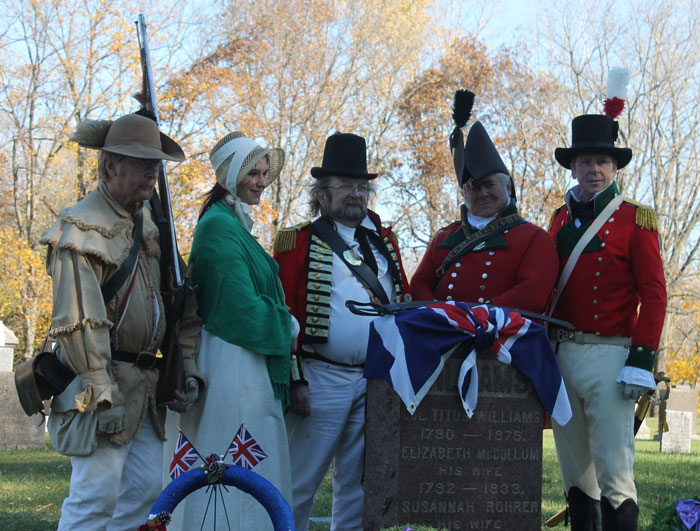Commanding Officer: Captain Henry Nelles
Category Archives: Veteran
War of 1812 Veteran
William Osburn
Robert McNeil Miller
1st Regiment Leeds Militia
Robert McNeil Miller came to Leeds County in Upper Canada along with the McNeil family settling in Lansdowne Township.
Continue reading Robert McNeil Miller
1st Regiment Leeds Militia
Seneca Washburn
2nd Regiment Leeds Militia
Seneca Washburn was born in Manchester, Bennington Co., Vermont in 1796 to Stephen Washburn and the former Asenath Sexton. The Washburn family along with some members of the Sexton family came to Leeds County, Upper Canada about 1806 settling in Lansdowne Township.
William Webster
2nd Regiment Leeds Militia
In 1812 at the age of twenty years William Webster emigrated from County Wexford, Ireland with other members of his family arriving in Upper Canada where they settled in the rear of Lansdowne Township.
Jonathan Austin
2nd Regiment Norfolk Militia
Jonathan, the second son of Solomon Austin, m Miss Hannah Potts, and had seven children. He and his son John built Austin’s mills in the Lynn Valley.
In the war of 1812, true to their principles of loyalty, the father and four sons (Solomon Jr., Jonathan, Phillip and Moses) shouldered their muskets and marched under Brock to fight the hated “Yankees,” once more. They fought at Malcolm’s Mills (Oakland), Fort Malden, Fort Detroit, Fort Erie, Nanticoke Creek, McCrae House and Lundy’s Lane. In the 2nd Regiment Norfolk Militia Jonathan attained the rank of Captain and his commanding officer was Lieutenant Colonel Robert Nichol. The descendants of this family are the most numerous of any of the families of the settlement.
Sources
Officers of the British forces in Canada during the War of 1812-15
John Button1st Regiment York Militia
John Button according to his Upper Canada Land Petition dated 22 May 1798, “having been prevailed upon by his Relations” came to the Province on 6 Feb 1798. It is not known why he did not apply for UEL status but his loyalty to the crown was later proven. He did at this time request 200 acres of farm land in York. This was approved on 17 Nov 1801 having met the criteria “remains in the Province for 12 months or brings his family in”
John Beriah Tree
Oxford Militia
Veterans of the war of 1812 gathered in Woodstock in 1875 to get their pensions and John B Tree was at that time 92 years old and stated that he had served at Dover, Turkey Point and at the repulse at Turkey River near Malden.
Titus WilliamsFlank Company2nd Regiment Norfolk Militia
Colonel Titus Williams, born Long Island, 22 November, 1790, son of Captain Jonathan Williams, of the British Army. Received Ensign’s Commission in the 2nd Regiment Norfolk Militia. Volunteered on 27 June 1812, the day of the war’s outbreak, appointed Lieut., in Left Flank Company. Commanded a detachment of Norfolk men at Detroit. Became Captain and Adjutant of the 2nd Regiment Norfolk Militia at Detroit some time later. Was afterwards captured by Americans on Niagara River, sentenced to be executed, but was liberated in May, 1814. Immediately appointed Adjutant of the 4th Regiments Norfolk Militia and was at Lundy’s Lane. Then placed in command of the 103rd Regulars at Dover and Ryerse.
Continue reading Titus WilliamsFlank Company2nd Regiment Norfolk Militia
Phillip Austin
2nd Regiment Norfolk Militia
Philip Austin is the third son of Solomon Austin and m Mary Slaght, a sister of his eldest brother’s (Solomon Jr.) wife, and had a family of 16 children.
Solomon Austin
2nd Regiment Norfolk Militia
Solomon Austin was originally from North Carolina. He was a private in the Queen’s Rangers and served all through the American Revolutionary War. On one occasion, at least, he exhibited conspicuous bravery. This was at the battle of the Horseshoe. The standard-bearer was killed and the flag fell to the ground and was in danger of being lost. Solomon Austin leaped forward, and grasping the standard bore it bravely till the close of the action. After the battle Major-General Simcoe inquired his name, praised him in public before the marshalled company, and gave him to understand that if he could ever be of service to him afterwards his bravery would not be forgotten.

